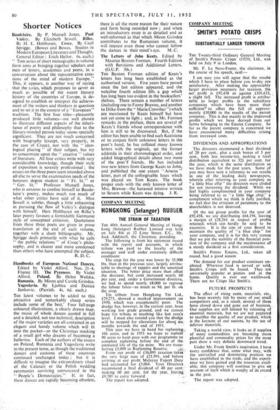Shorter Notices
Baudelaire. By P. Mansell -Jones. Paul Valery. By Elizabeth Sewell. Rilke. By H. E. Holthusen. Croce. By Cecil Sprigge. (Bowes and Bowes. Studies in Modern European Literature and Thought. General Editor : Erich Hellor. 6s. each.) " THIS series of short monographs in volume form aims at bringing together scholars in men of letters, academics and poets, m a conversation about the representative crea- tions of the mind of modern Europe." This, it appears, is another way of saying that the series, which proposes to cover as much as possible of the recent literary history of the countries of Europe, is de- signed to establish or interpret the achieve- ment of the writers and thinkers in question and to set it in the context of a "European" tradition. The first four titles—pleasantly produced little volumes—are well chosen to illustrate different aspects of the inheri- ta,nce of poetry and philosophy that to the literary-minded person today seems specially significant. They are not much concerned with biography (except, very properly, in the case of Croce), nor with the " ideo- logical placing " of their subject, but try to concentrate upon the " creative " values of literature. All four critics write with very considerable knowledge, though their style of exposition is severely professional ; the essays on the three poets seem intended above all else to serve the examination needs of the honours degree student in " Fr. lit." or " Ger. lit." Professor Mansell Jones, who is anxious to confine himself to Baude- laire 's poetry, makes much too much of what other critics have said of it. Miss Sewell is subtler, though a little exhausting in pursuing the flow of Valei-y's dialogue with himself. Herr Holthusen on Rilke's later poetry favours a formidably Germanic style of concepthal criticism. Quotations from these three poets are given in prose translation at the end of each volume, together with a short bibliography. Mr. Sprigge deals primarily with what he calls " the public relations " of Croce's philo- sophy, and is clearer and more condensed than others who have.attempted the subject.
R. D. C.







































 Previous page
Previous page